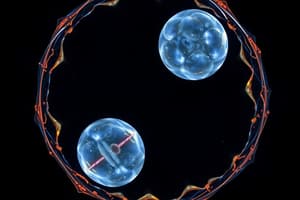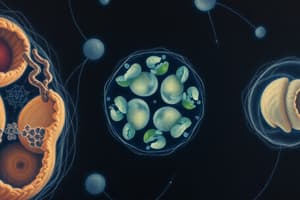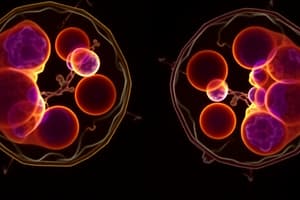Podcast
Questions and Answers
A cell has a mutation that disables the G1 checkpoint. What is the most likely consequence of this mutation?
A cell has a mutation that disables the G1 checkpoint. What is the most likely consequence of this mutation?
- The cell will divide uncontrollably, potentially leading to tumor formation. (correct)
- The cell will enter G0 phase and remain metabolically inactive.
- The cell will immediately undergo apoptosis.
- The cell will skip the S phase and directly enter the G2 phase.
Which of the following is a key difference between cytokinesis in plant and animal cells?
Which of the following is a key difference between cytokinesis in plant and animal cells?
- Animal cells form a cell plate, while plant cells form a cleavage furrow.
- Plant cells form a cell plate, while animal cells form a cleavage furrow. (correct)
- Cytokinesis only occurs in plant cells, not animal cells.
- Cytokinesis only occurs in animal cells, not plant cells.
During which phase of meiosis does crossing over occur, and what is its significance?
During which phase of meiosis does crossing over occur, and what is its significance?
- Anaphase II; separates sister chromatids
- Metaphase I; ensures proper chromosome segregation
- Prophase II; increases genetic diversity among daughter cells
- Prophase I; increases genetic diversity among daughter cells (correct)
A cell with 46 chromosomes undergoes meiosis. How many chromosomes will each daughter cell have at the end of meiosis II?
A cell with 46 chromosomes undergoes meiosis. How many chromosomes will each daughter cell have at the end of meiosis II?
How does the function of kinetochores contribute to the accuracy of chromosome segregation during mitosis?
How does the function of kinetochores contribute to the accuracy of chromosome segregation during mitosis?
Flashcards
Binary Fission
Binary Fission
A type of asexual reproduction where a cell divides into two identical daughter cells.
Cell Cycle
Cell Cycle
The series of events that take place in a cell leading to its division and duplication.
G0 Phase
G0 Phase
Resting phase where cells exit the cell cycle and stop dividing.
Centromere
Centromere
Signup and view all the flashcards
Mitosis
Mitosis
Signup and view all the flashcards
Study Notes
- Cell division includes multiple terms and ideas related to the cell cycle, mitosis, meiosis, and other processes.
Terms
- Binary fission is a type of asexual reproduction.
- Cell cycle consists of G1, S, G2, and M phases.
- G1 is the first growth phase in the cell cycle.
- S is the synthesis phase where DNA replication occurs.
- G2 is the second growth phase in the cell cycle.
- M is the mitosis phase, involving cell division.
- G₀ is a resting phase where cells exit the cell cycle.
- Interphase is the phase of cell cycle before cell division, including G1, S, and G2 phases.
- Chromosomes contain the genetic information, with a specific number in humans.
- Human cells have a characteristic number of chromosomes.
- Human types refer to different kinds of human cells.
- Homologous chromosomes are chromosome pairs with the same genes.
- A chromatid is a single copy of a duplicated chromosome.
- The centromere is the region where sister chromatids are joined.
- Kinetochore is a protein structure on chromatids that allows them to attach to the spindle.
- Mitosis is a type of cell division that results in two identical daughter cells, including prophase, metaphase, anaphase, and telophase.
- Prophase is the first phase of mitosis, where chromosomes condense.
- Metaphase is when chromosomes line up in the middle of the cell.
- Anaphase is when sister chromatids separate and move to opposite poles.
- Telophase is the final phase of mitosis where the nuclear envelope reforms.
- Spindle fibers are structures that separate chromosomes during cell division.
- Centrioles organize the spindle fibers.
- Centrosomes are the organelles that contain the centrioles.
- Cytokinesis is the division of the cytoplasm to form two new cells.
- Plant cells form a cell plate during cytokinesis.
- Animal cells undergo cytokinesis through cleavage.
- Cell cycle checkpoints are control mechanisms to ensure proper cell division, including G1, G2, and M checkpoints.
- Cyclins are proteins that regulate the cell cycle.
- Cancer is uncontrolled cell growth, leading to tumors.
- Tumors can be benign or malignant.
- Benign tumors are non-cancerous.
- Malignant tumors are cancerous and can metastasize.
- Metastasis is the spread of cancer cells to other parts of the body.
- Diploid cells contain two sets of of chromosomes.
- Haploid cells contain one set of chromosomes.
- Meiosis is a type of cell division that produces haploid gametes.
- Crossing over is the exchange of genetic material during meiosis, resulting in genetic variation of the combinations of alleles in each chromosome.
Studying That Suits You
Use AI to generate personalized quizzes and flashcards to suit your learning preferences.




